26+ Work From Home Policy
-
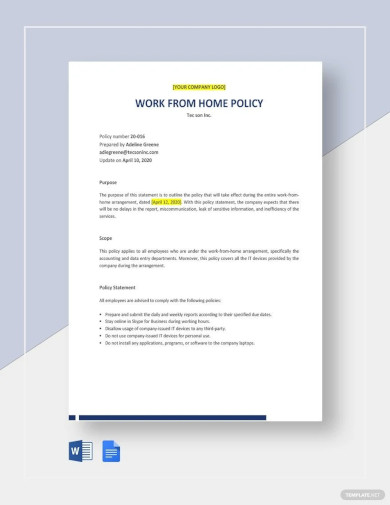
Work From Home Policy Statement
download now -
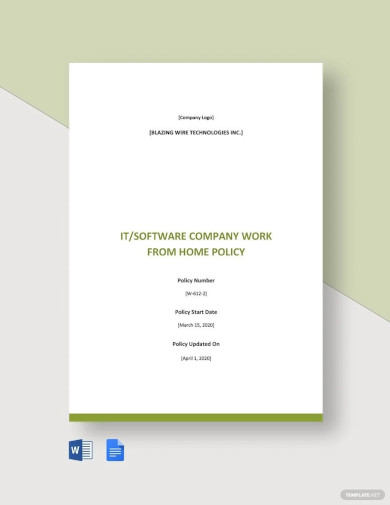
IT and Software Company Work from Home Policy
download now -
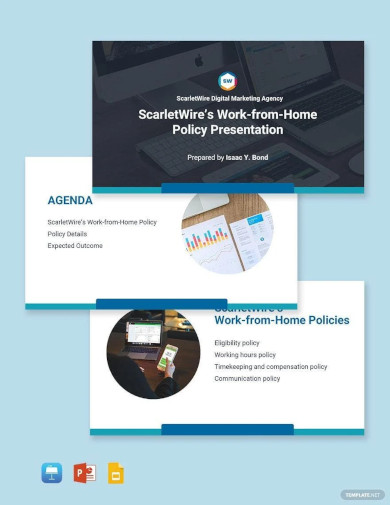
Work From Home Policies Presentation
download now -

Emergency Work-From-Home Policy
download now -
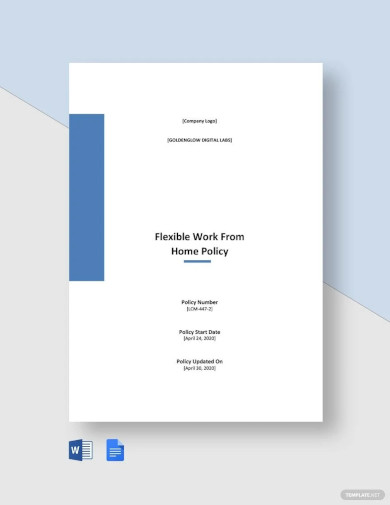
Flexible Work From Home Policy
download now -
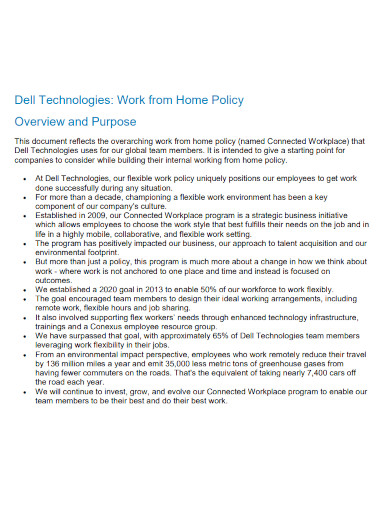
Work From Home Policy Document
download now -
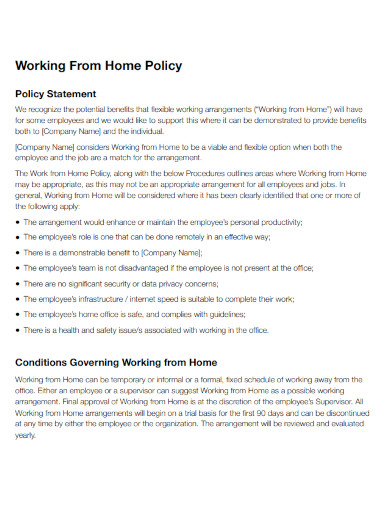
Employee Work From Home Policy
download now -
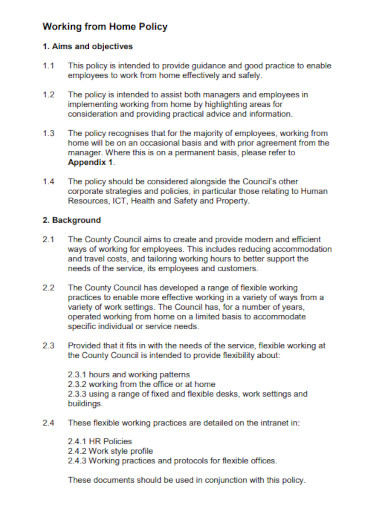
Sample Work From Home Policy
download now -
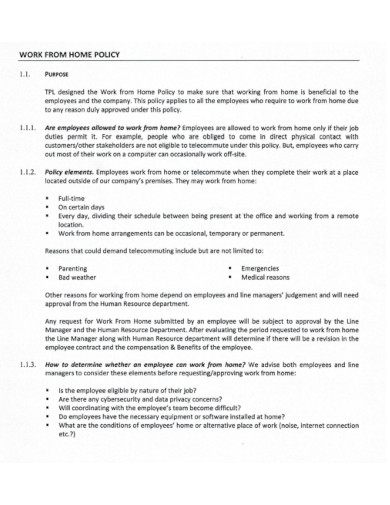
Company Work-From-Home Policy
download now -
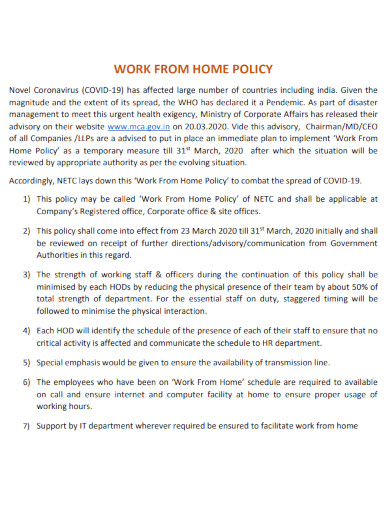
COVID-19 Work-From-Home Policy
download now -
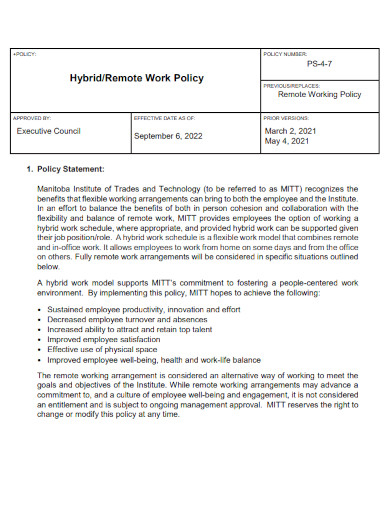
Hybrid Work-From-Home Policy
download now -
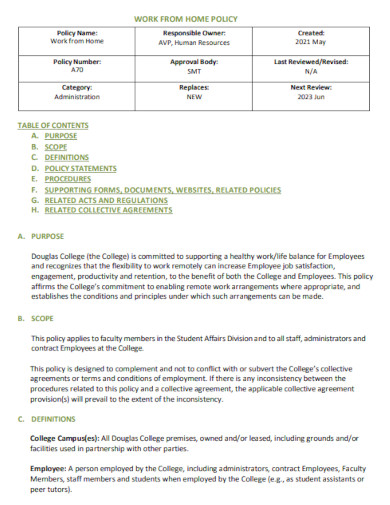
HR Work From Home Policy
download now -
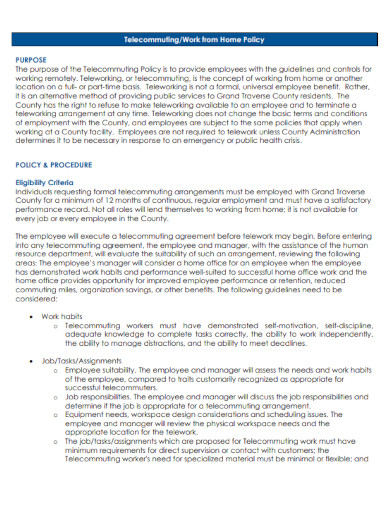
Telecommuting Work From Home Policy
download now -
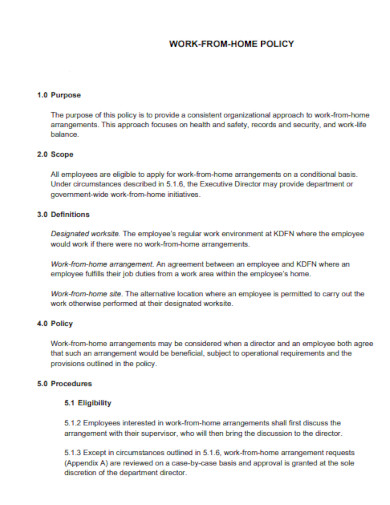
Work From Home Policy Example
download now -
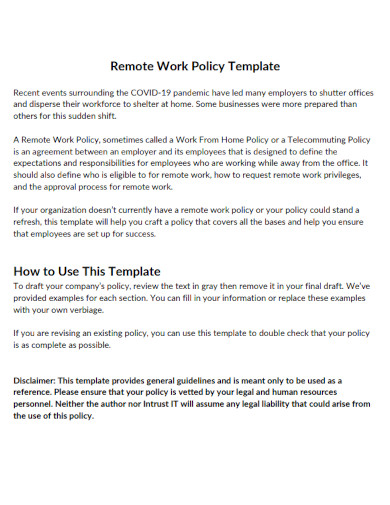
Standard Remote Work Policy
download now -
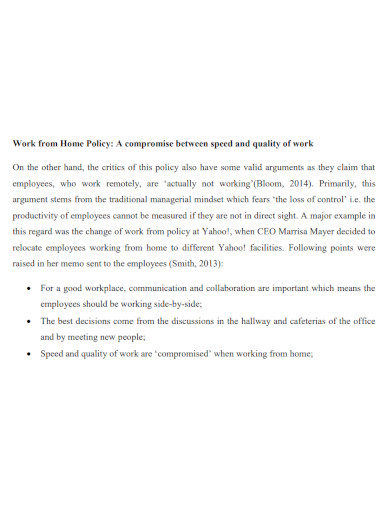
Modern Work From Home Policy
download now -
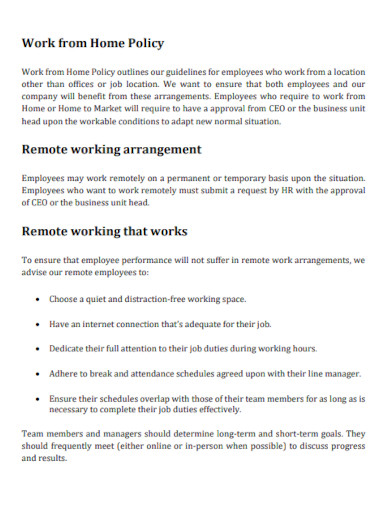
Printable Work From Home Policy
download now -
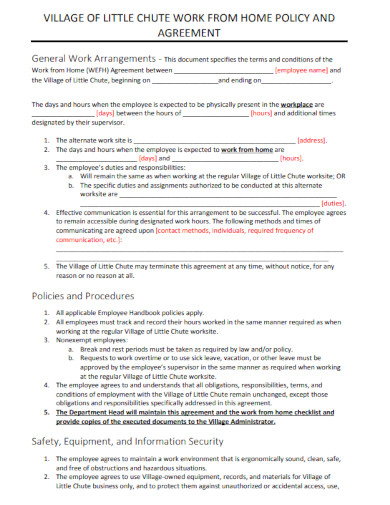
Work From Home Policy and Agreement
download now -
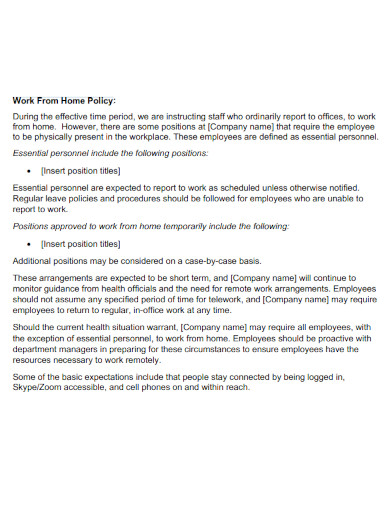
Office Work From Home Policy
download now -
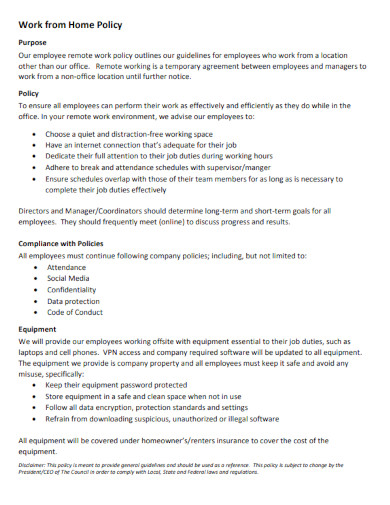
Simple Work-from-Home Policy
download now -
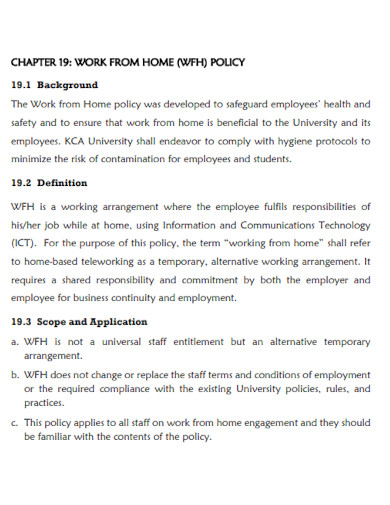
Editable Work from Home Policy
download now -
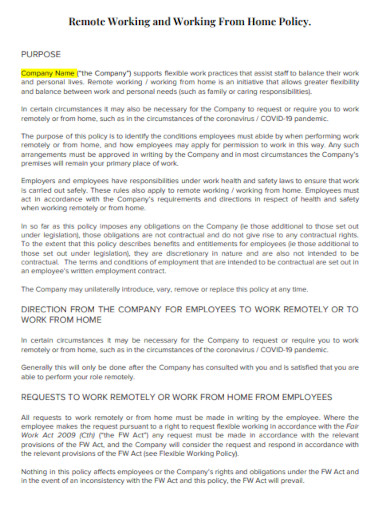
Essential Work from Home Policy
download now -
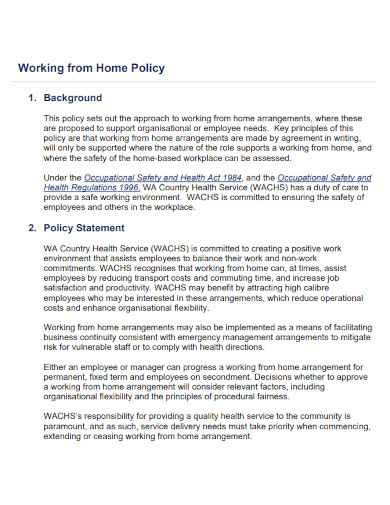
Health and Safety Work from Home Policy
download now -
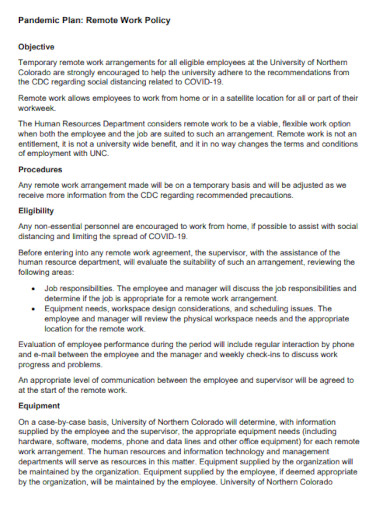
Work from Home Policy Plan
download now -
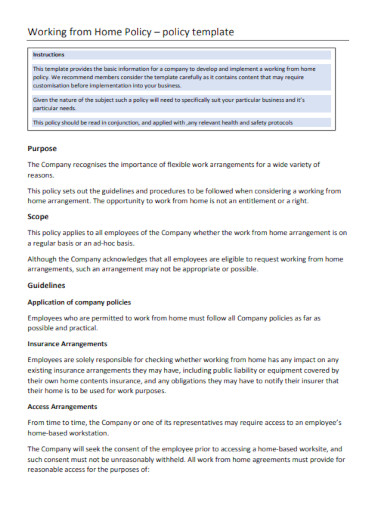
College Work from Home Policy
download now -
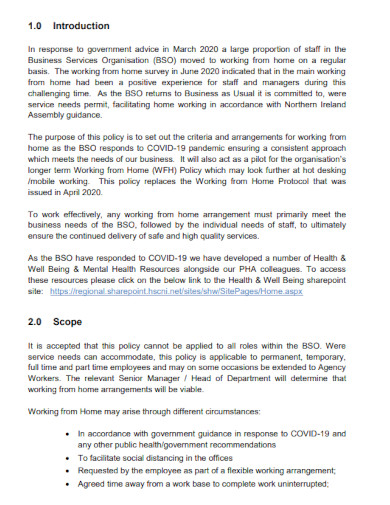
Interim Work from Home Policy
download now -
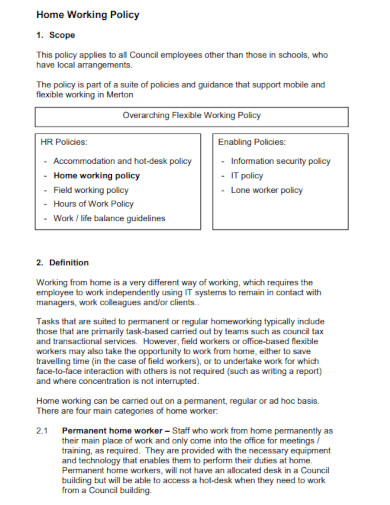
Work from Home Policy Draft
download now
FREE Work From Home Policy s to Download
26+ Work From Home Policy
What Is a Work From Home Policy?
Benefits of Working From Home
Tips for Working From Home
How to Create a Work-From-Home Policy
FAQs
How do remote workers maintain company culture?
How can businesses guarantee productivity?
What makes a good work-from-home policy?
What Is a Work From Home Policy?
A company’s work-from-home policy is a formal document that establishes rules, regulations, and procedures for remote or telecommuted employees. The policy specifies the terms and conditions under which employees can labor from home or other off-site locations. It helps ensure consistency, transparency, and clarity in remote work arrangements and establishes employee and employer expectations. Create a policy that addresses crucial aspects of working from home, such as communication, data security, and employee health and well-being, to provide a supportive remote work environment for your employees and leverage the potential of a remote or hybrid workforce.
Benefits of Working From Home
Numerous businesses now offer employees the option to operate from home or in the office. Working from home could make you a more effective and efficient employee, depending on your industry and preferable work environment. The following are some of the advantages it can offer to employees.
Tips for Working From Home
The most significant advantage of working from home is the increased flexibility. However, this luxury can frequently become a lost opportunity if not handled cautiously. Keeping this in mind, here are some essential work-from-home strategies that are simple to implement. They say working from home can be a diagnostic test for productivity. The vast majority of individuals believe that remote work reduces efficiency. Many argue that intrinsic motivation is necessary to complete tasks list efficiently and on time when working from home. When working from home, it is less likely that you will leave the house and follow a typical work routine. You must master the fundamentals to maintain a well-organized way and avoid compulsions.
1. Prepare for the Workday
While it is unnecessary to dress as formally as you would for work, changing your clothing will indicate that it is time to get up and start working; our minds are wired to take cues from our social and personal outlooks when making decisions. When you dress for work, you give the brain a rationale. It functions as a natural alarm that keeps you alert throughout the day. Getting dressed involves all appearance-related tasks, including showering, styling hair, and applying minimal cosmetics. These characteristics render you presentable. Moreover, working from home does not preclude people from seeing you. You may be required to attend video conferences, which are highly prevalent today.
2. Select an Appropriate Home Office
What is the most advantageous aspect of working from home? Most likely, the convenience of working from anywhere, such as the living room or the bedroom. But are you aware that this solace may come at the expense of productivity, concentration, and goal attainment? For many, working from home is advantageous because they can do so from their bed or couch. However, our messed-up sleep schedules make it incredibly difficult to concentrate or even resist falling unconscious. Thus, you can either succumb to your apathy, which is highly demotivating, or decide to leave the allure of your typical home environment. The latter is always superior and more efficient. You could be sitting anywhere and working on your to-do list when a movie or advertisement begins to play on the television. What is your immediate response? You create a diversion by turning around and glancing backward. If you choose a random location to labor, unexpected occurrences may occur. Distractions in remote employment are pervasive. Therefore, having a private space will be highly beneficial. A dedicated workspace will allow you to remain focused on your task by providing an environment resembling an office. Because ultimately, concentration is the key to productive results.
3. Implement Superior Technology
There are benefits and liabilities to working remotely. Even if we enjoy working at our own pace, having a slow internet connection or using antiquated technology might be annoying. What happens if your system crashes or your internet connection drops while you’re in a crucial meeting? It may be an extremely embarrassing circumstance that detracts from your professionalism. The best tools for remote employees are reliable internet or a functional system.
4. Maintain Regular Working Hours
How frequently do you lose track of time when you labor from home? Almost daily, correct? When your consciousness is wholly occupied with work, you may lose track of time. However, this behavior is detrimental. Workaholism is beneficial, but only during working hours. You should avoid overdoing it. A healthy work-life balance is important when working from home. Your personal and professional lives are equally crucial. It would help if you permanently established a routine for your workdays and working hours, and it should be organized so you can easily adhere to it.
How to Create a Work-From-Home Policy
A well-defined work-from-home policy ensures remote workers perform their duties effectively. Remember that the policy sets guidelines that give employers confidence in employees’ ability to remain productive away from the office. Here are some methods to create a policy for remote work:
1. Identify Those Who May Work From Home
First, determine which positions within the organization can be performed remotely. Determine which employees are capable of maintaining a solid work ethic off-site. Consider whether you can provide them with instruments or software to enhance their productivity. Determine if you wish to offer a flexible remote policy statements if some or all employees occasionally prefer to work from home. Also, describe the objectives and expectations for remote work productivity, communication, and technology use.
2. Create and Facilitate Communication Procedures
Since face-to-face communication isn’t possible when working remotely, think of alternatives to facilitate communication. Find the ideal communication protocol for the team by studying the expenses and functionality of several protocols. Additionally, as remote workers perform digital tasks, it’s critical to stress the value of digital security in the work-from-home policy.
3. Clarify the Expenses Reimbursed
Although remote workers save money on transportation costs, they may incur more extraordinary expenses at home due to the need for high-speed internet, phones, and electricity. You can provide certain benefits. The WFH policy can specify which costs the company will fund. These benefits enhance employee productivity and provide additional value to their work-life equilibrium.
4. Provide Details Concerning Timekeeping
If hourly, non-exempt employees are interested in working remotely; they must be able to log their hours and submit them to their superiors. Typically, companies use a sample timesheet website or software to ensure their remote employees work the required hours. The policy may specify timekeeping procedures for remote environments.
FAQs
How do remote workers maintain company culture?
Staying connected through the company’s selected communication channels is essential when you have remote employees. To maintain connections, consider organizing virtual and in-person appreciation or team-building events, such as happy hours, holiday parties, and achievement celebrations. So that they feel included, you could provide office amenities such as a healthy snack delivery package or catered meals.
How can businesses guarantee productivity?
Employers can utilize various instruments to monitor remote workers’ productivity. While it is essential to motivate employees regarding their remote performance continually, you can train them to succeed independently and check in with them regularly. Consider holding monthly meeting agenda to discuss progress and set new objectives.
What makes a good work-from-home policy?
Create a policy that addresses crucial aspects of working from home, such as communication, data security, and employee health and well-being, to provide a supportive remote work environment for your employees and leverage the power of a remote or hybrid workforce.
As the demand for flexible work arrangements increases, companies are adopting work-from-home (WFH) models to ensure that employees can take advantage of these benefits while still meeting job requirements. Adequate remote work opportunities can attract more qualified candidates, reduce administrative expenses, and boost productivity. Understanding the function of a work-from-home policy can help you develop one that increases the job satisfaction of your team members.
